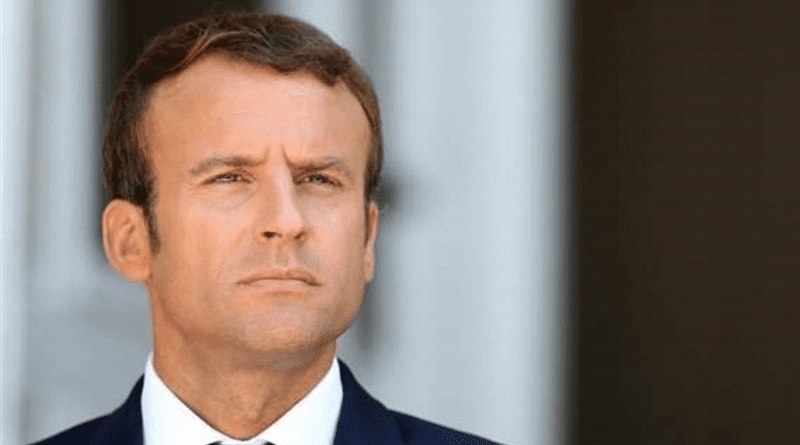France: Macron Dissolves Assembly, Calls Snap Election Amid Far-Right Surge
By EurActiv
By Laurent Geslin and Théo Bourgery-Gonse
(EurActiv) — French President Emmanuel Macron announced on Sunday (9 June) he would dissolve the National Assembly and call snap legislative elections as the far-right nationalists triumphed in the European elections with 32.3% of the vote, against 15.2% for Macron’s Besoin d’Europe list.
“Extreme right-wing parties, which in recent years have opposed so many of the advances made possible by our Europe, (…) are gaining ground across the continent,” the president said in a solemn speech from the Elysée on Sunday (9 June) evening.
“After carrying out the consultations provided for in Article 12 of our Constitution, I have decided to give you back the choice of our parliamentary future through the vote”, he said.
He announced new election dates on 30 June and 7 July – just weeks before France is set to host the Summer Olympic Games.
The announcement caused a political earthquake in France, amid a surge of the far-right’s Rassemblement national (RN) in the European elections – which the polls had been predicting for months.
The RN, led by the veteran Marine Le Pen and the up-and-coming Jordan Bardella, is set to send 31 MEPs to the European Parliament, where they sit in the far-right Identity and Democracy group.
Socialist Party list leader Raphaël Glucksmann was quick to criticise Macron, saying he could not understand why the French president “is obeying Jordan Bardella. We will lead the fight against the extreme right”.
RN lead candidate Bardella has asked Macron several times to dissolve the National Assembly should the far right come out on top.
Macron’s Besoin d’Europe list trails way behind with 15.2% of the vote share, expected to send 14 lawmakers to Brussels, while Glucksmann’s socialists secured 13 seats.
The RN has come out on top in European elections for the third time in a row, but never had it reached such levels of support across all population groups, or such a significant gap with the runner-up.
According to available estimates, it is also set to secure the European Parliament’s largest delegation in numbers, ahead of Germany’s conservative CDU/CSU.
If confirmed by consolidated data, this would mark a symbolic victory and strengthen the party’s influence within their ID)group.
It could also help facilitate future negotiations with the nationalist-conservative European Conservatives and Reformists (ECR) group, chaired by Italian Prime Minister Giorgia Meloni’s Fratelli d’Italia – as Marine Le Pen hinted a few weeks ago she would be willing to unite with other European far-right movements.
In another upset for Macron, Eric Zemmour’s far-right anti-immigration Reconquête! Movement could also be in a position to send four or five MEPs – from one currently – to the European Parliament’s ECR group, with 5.1% of the vote share. More complete results, due in the next few hours, will be necessary to clarify their standing.
Severe warning
With the results, voters sent Macron the most severe warning yet – as his list saw support dwindle from five years ago, and is set to lose eight or nine MEPs.
Its lead candidate Valérie Hayer failed to give the campaign the boost it needed, and the personal involvement of Macron and Prime Minister Gabriel Attal, including the latter’s televised debate with RN’s Bardella, have done nothing to turn the tide around.
“We have prepared ourselves for a rough outcome,” a ministerial adviser told Euractiv, refusing to blame it on Hayer, “who has done as well as she possibly could have done”.
This will soon raise questions over the French liberals’ influence over Renew Europe: Group president Hayer has already faced a backlash over her call to oust the Dutch VVD party because of their national coalition agreement with the far-right.
Everything is even more up in the air with the country entering campaign mode.
Conservative Les Républicains fell from 8.48% in 2019 to 6.9% and possibly six seats.
Their lead candidate Bellamy banked on his party’s severe criticism of European Commission President Ursula von der Leyen and did not rule out ad hoc political alliances with the European Conservatives and Reformists (ECR) – but it does not seem to have swayed voters.
The disunited left-wing movements posted bittersweet results.
France’s new social-democrat sweetheart Glucksmann managed to double the size of his delegation from six MEPs to possibly 13, attracting disappointed voters from both the Macron camp and the far-left, but he failed to overtake Besoin d’Europe as the runner-up, settling for 14.3% of the vote share.
“I’m proud of what we’ve done together, but I’m not in the mood to celebrate. The far right now accounts for 40% of the vote in France”, he explained. “Our responsibility is to fight the inexorable rise to power of the extreme right. We will never resign ourselves to that”.
The far-left La France insoumise (LFI) seems to be reaping the benefits of a campaign heavily focused on the defence of Palestine, with 8.3% of votes, and is likely to gain one or two more seats, compared to the 2019 results.

